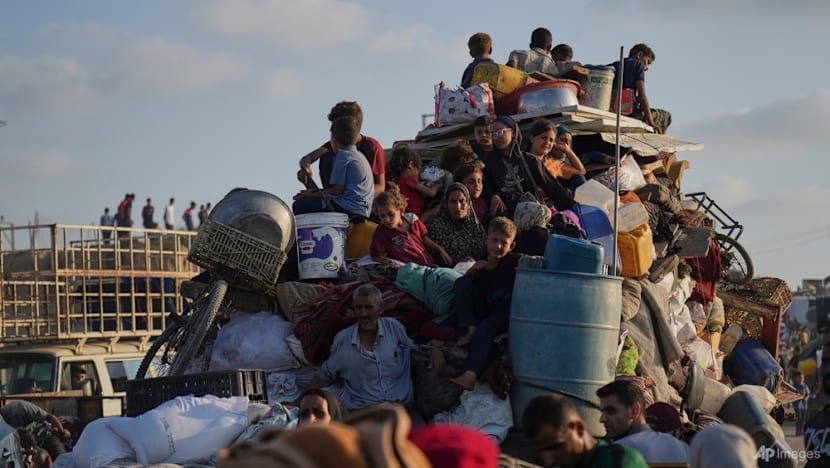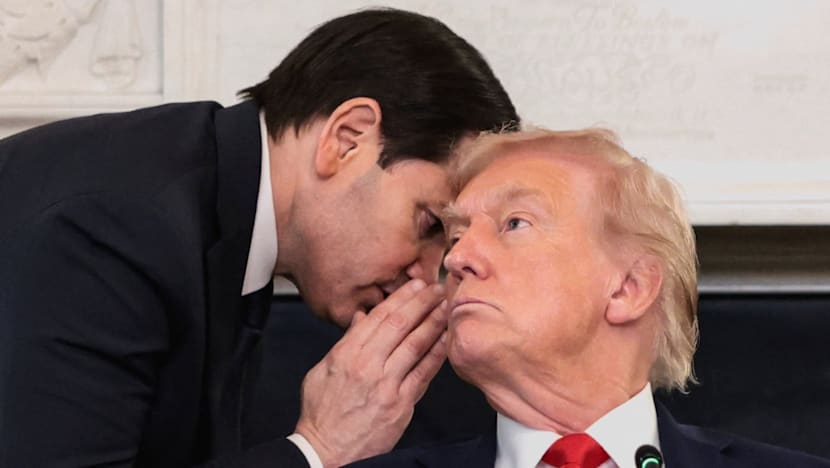CNA Explains: Trump’s Gaza ceasefire deal - will it bring lasting peace between Israel and Hamas?
Observers told CNA the deal represents a long-overdue step toward ending the war, but stressed that many details must still be resolved before real progress can take hold.

Displaced Palestinians flee northern Gaza by foot and in vehicles, carrying their belongings along the coastal road toward southern Gaza, Monday, Sept. 15, 2025. (AP Photo/Abdel Kareem Hana)

This audio is generated by an AI tool.
Israel and Hamas’ deal on the first phase of United States President Donald Trump’s Gaza peace plan marks a diplomatic breakthrough in the two-year war that has shaken the Middle East.
However, analysts say the path to lasting peace is fraught with risks and hard choices.
Trump announced on Wednesday (Oct 8) that the two sides had agreed to a Gaza ceasefire and hostage release — the first phase of his 20-point peace plan unveiled last week to end the war in the Palestinian enclave.
Observers told CNA this agreement represents a long-overdue step toward ending the war, but stressed that many details must still be resolved before meaningful progress can take hold.
“It is frustrating that in many ways, both sides could have come to an agreement much earlier and saved an enormous amount of death and destruction,” said Stephen Zunes, professor of politics at the University of San Francisco.
“But this is certainly a positive development most immediately for the hostages and their families, but also for the Palestinians in Gaza if it holds.”
Hamas launched its deadly attack on Israel on Oct 7, 2023, killing about 1,200 people and abducting around 250 hostages. Of the 48 hostages still held, 20 are believed to be alive.
Israel’s devastating retaliatory campaign in Gaza has since killed more than 67,000 people and displaced nearly the entire population, according to Palestinian health authorities.

What is the Israel–Hamas agreement about?
The breakthrough followed indirect talks in Egypt, just a day after the second anniversary of the Hamas’ attack.
Trump said both sides had signed off on the agreement, which calls for the release of all hostages – alive and dead – “very soon”, and a withdrawal of Israeli troops to a proposed yellow line inside Gaza, marking the boundary for the initial pullback.
Hamas confirmed the deal, saying it includes an Israeli withdrawal and a hostage-prisoner exchange, but urged Trump and guarantor states to ensure Israel fully abides by the truce.
The Israeli government said it expects hostages held in Gaza to start being released on Saturday.
Javed Ali, associate professor of practice at the University of Michigan's Gerald R Ford School of Public Policy, said Israel and Hamas have carried out similar exchanges before – including hostage releases in late 2023 and early 2024 – and this latest operation will take time to organise.
He explained that the 20 remaining living hostages are likely scattered across multiple locations.
Each would need to be screened and handed over “in a very dignified way to whomever is going to receive them”. The same care, he added, would apply to the return of those who have died.
“I expect even if this is the first big thing to happen, it would take at least a few days for all of that to move forward,” said Ali, a former senior official at the National Security Council during the first Trump administration from 2017 to 2021.
What drove both sides to finally reach a deal?
Experts said Israel and Hamas were ultimately driven to the table by unprecedented pressure and a shared sense of exhaustion.
With Hamas’ leadership weakened and Israel facing political uncertainty with elections expected next year, conditions were ripe for a ceasefire to take hold.
Jonathan Panikoff, director at think tank Atlantic Council’s Scowcroft Middle East Security Initiative, said Hamas faced rare unified pressure from Egypt, Qatar and Turkiye. Turkish intelligence chief Ibrahim Kalin was reportedly involved in the latest talks.
For Israel, Prime Minister Benjamin Netanyahu’s growing political isolation, compounded by a misstep in authorising a strike on Hamas leaders in Qatar last month, gave Washington an opening to push harder.
Zunes of the University of San Francisco said many Israelis have realised that the global sympathy they received after the Oct 7 attacks has evaporated, leaving the country increasingly isolated.
He added that Israel “ended up blowing its political capital,” as the reputational and economic costs of the war far outweighed its limited military gains, particularly given that most casualties have been civilians.
“I think this is in many ways a hurting stalemate that both parties found that they were losing and that it was really time to try to stop the bloodshed, at least for now,” he said.
What issues remain unresolved under the deal?
These include who will govern Gaza, what becomes of Hamas, and how Israeli troops will be withdrawn.
Under Trump’s 20-point plan, Gaza will come under a temporary technocratic administration – an apolitical Palestinian committee tasked with managing daily public services and municipal affairs. The body will comprise qualified Palestinians and international experts.
But the Atlantic Council’s Panikoff said it is unclear whether this framework will ultimately materialise.
He cautioned that while relief over the ceasefire is justified, the deal could “get stuck in neutral” unless the US and its Arab partners maintain strong pressure to carry the process into its next phases.
Trump’s plan envisions the Palestinian Authority taking over but only after major reforms. A Hamas role has been ruled out even though the militant group has controlled Gaza since 2007.
Zunes said that curbing extremism depends on establishing a representative Palestinian government with real autonomy, free from siege and occupation.
Rebuilding Gaza, he noted, must go beyond physical reconstruction to ensuring Palestinians can govern themselves.
“It has to be a leadership that the people respect and that can lead them to eventual independence,” he said.
“But the ceasefire is going to have to hold. The redevelopment itself is not going to happen if the potential investors fear another war is going to break out at any time.”
What could jeopardise the Gaza deal?
The successful completion of the deal would stand as Trump’s most significant foreign policy achievement so far.
Trump, who has made no secret of his desire to win a Nobel Peace Prize, has taken a hands-on role, using America’s considerable leverage over Israel to push both sides toward an agreement – a level of involvement experts say he is likely to maintain through the next phase.
If the deal holds, it would be seen as a major accomplishment – one that could influence domestic politics in the US, said the University of Michigan’s Ali.
“He has used that power of the presidency – that only a US president can to get to this point – and now it remains to be seen just how things will transition under phase one.”
Yet some analysts remain sceptical that Israel will honour the ceasefire once all hostages are released.
Zunes pointed out that Hamas had upheld a fragile truce brokered in January, only for Israel to break it soon after with large-scale airstrikes on Gaza.
This raises doubts about whether Israel will agree to a lasting ceasefire or resume bombing once the hostages are freed, he added.
Hamas, aware that releasing the hostages would mean losing its key leverage, has demanded firm assurances that Israel will not resume military operations once the captives are freed.
“I would think on the Hamas side, they would not have agreed to this if they did not believe that at some level they had guarantees that Israel – soon after the recovery and return of the hostages – will not just commence the sort of full-blown military operations that we've seen,” said Ali.
“So one would think that they must feel confident about that because if they didn't, then they've let their guard down.”
Meanwhile, Netanyahu, who has consistently reiterated his demand for Hamas to be eliminated, could find himself in a tight spot.
“There are a couple of far-right ministers who have repeatedly threatened to leave the government if some kind of ceasefire agreement was reached,” said Zunes.
He added that many believe Netanyahu has prolonged the war to delay elections he would likely lose. This would help him to avoid facing prosecution on multiple corruption charges.
“Given how narrow his majority is in the Israeli Knesset, that could bring down the government,” said Zunes.
“But my suspicion is that some of the more centrist parties have agreed to give Netanyahu cover, to enable a ceasefire agreement to go into effect and to hold on at least for a couple of months.”

















